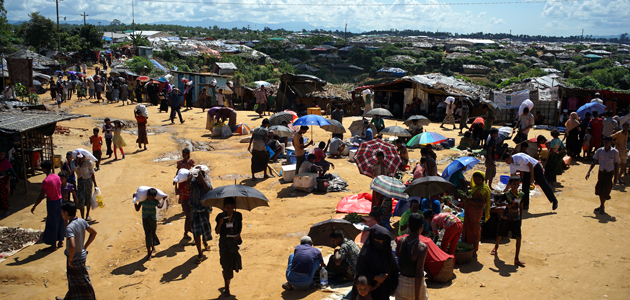News & Updates
“No single agency can meet the massive health needs” of Rohingya Refugees in Bangladesh, says WHO
29 March 2018

Healthcare is a key priority for Rohingya refugees in Bangladesh, with numerous agencies committing to help provide critical healthcare.
The World Health Organisation (WHO) has made a further appeal for supporting the needs of 1.3 million Rohingya refugees in Bangladesh as monsoon season nears.
In addition to risks from flooding and landslides, refugees in Bangladesh also face significant health risks due to the rainy season.
Last week the UK Department for International Development announced commitments to protect the communityfrom flooding and landslides.
Dr Poonam Khetrapal Singh, Regional Director, World Health Organization South-East Asia, commented on the threat of monsoon season:
“This is one of the biggest humanitarian crisis in recent times. No single agency or the Government of Bangladesh alone can meet the massive health needs of such a large population group. The Rohingya population are settled in an area that is prone to cyclone, and a terrain that would be flooded as soon as rains begin. The risk of outbreak of life threatening water and vector borne diseases under such conditions is huge”
WHO is aiming to minimise disease and death during the monsoon season by coordinating over 100 partners alongside the Ministry of Health.
April will see a new cholera and measles campaign launched by WHO as a preventative measure for the most vulnerable. 900,000 cholera vaccines have already been administered to refugees and host communities in addition to measles and diphtheria vaccination campaigns.
Since the crisis began WHO has provided over 120 tonnes of supplies and logistics to partners to support the healthcare of the refugees.
However, with monsoon season approaching services will be stretched and greater funding is required to up-scale services quickly and adequately.
In addition to the risks posed by flooding and rainfall, the refugees also require services for reproductive, maternal, neonatal and child health; and communicable and non-communicable diseases.
The Government of Japan announced on 28th March 2018 that it would partner with UNFPA to provide sexual and reproductive health interventions for women and girls who have fled Myanmar.
With Japan’s support, UNFPA will deploy highly-skilled midwives to offer 24/7 care including antenatal, post natal, family planning, birthing and sexual violence services.
The increased support comes at a critical time for the refugees as monsoon season will increase healthcare demands.
Mr. Hiroyasu Izumi, the Ambassador of Japan to Bangladesh H. E. commented:
“There are many pregnant women and newborns in the area. It is very important to save such women and children. To this end, UNFPA can make good use of their expertise and provide case management and psychosocial support activities.”
Asa Torkelsson, Representative of UNFPA Bangladesh commented
“The Government and people of Bangladesh have shown immense generosity and compassion where not many would. Yet due to the sheer scale of this crisis, needs are still dire. This is why UNFPA is grateful that the Government of Japan has made a major commitment to saving the lives of women and girls, ensuring they will not die while giving birth and that those who have already suffered so much hardship and trauma can care for themselves and their families with dignity and without fear of further violence.”
It is estimated that over the next 3 months 16,500 will give birth in the refugee community, with 2,500 having life threatening complications.
If you’d like to stay informed on the latest updates in aid and development, please sign up for the AIDF newsletter.
Image credit: World Health Organisation